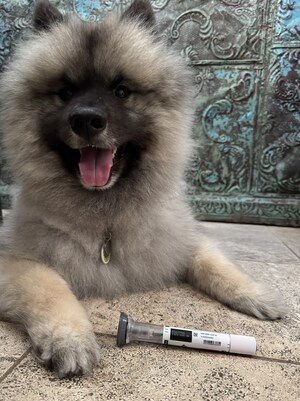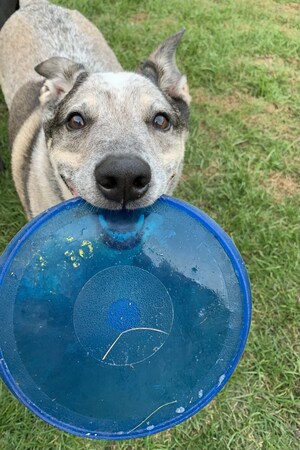Cats are Particularly Sensitive to Minoxidil, Found in Medications Like Rogaine®
MINNEAPOLIS, Aug. 9, 2023 /PRNewswire/ -- Humans are obsessed with hair. We have entire industries dedicated to growing it, losing it, regrowing it, artificially replacing it, washing it, cutting it, coloring it, shaving it, waxing it, styling it, covering it and photographing it. We even have a smash Broadway musical celebrating it.
Perhaps the biggest holy grail in the hair care industry is a cure for baldness. According to the American Academy of Dermatology, more than 80 million Americans suffer from hair loss. In honor of National Hair Loss Awareness Month in August, the toxicology experts at Pet Poison Helpline want to warn hair-loss medication users how dangerous it can be to pets.
"Products like Rogaine®, which contain the medication minoxidil, have helped many people with hair loss," said Dr. Renee Schmid, a senior veterinary toxicologist at Pet Poison Helpline. "Unfortunately, minoxidil can be very dangerous to animals. Cats are particularly sensitive to this medication, and any exposure can result in severe poisoning and potentially death. Dogs can develop clinical signs after being exposed to very small amounts of the medication as well, and often, the signs are not easily seen by owners."
Signs of poisoning in cats include anorexia, vomiting, lethargy, dyspnea (difficulty breathing) pulmonary edema (fluid in the lungs), pleural effusion (fluid in the chest), hypothermia (low blood pressure) and cyanosis (bluish discoloration of gums). For dogs, signs include lethargy, vomiting, bounding pulses, increased heart rate and low blood pressure. Signs usually occur within 45 minutes to a few hours.
When Robert from Las Vegas applies his minoxidil, he is usually very careful around his pets.
"I'm aware of some toxicity issues, so I usually make sure neither cat is nearby," Robert explained. "After I apply the minoxidil, I usually wear a hat, but it was my day off and I sat down on the couch. My cat Kratos jumped up next to me and I felt licking on my head. It had been 15-20 minutes since I applied the medication, so I didn't know how dry it was or what the danger could be." Robert called Pet Poison Helpline, and they recommended he take Kratos into the hospital for observation and possible treatment.
When Robert and Kratos arrived at VCA Mountain Vista Animal Hospital, the toxicology team was ready with treatment options. They recommended against induction of emesis based on the timing since ingestion of the cream, and instead suggested an anti-emetic to prevent vomiting and potential aspiration followed by one dose of medical grade activated charcoal to help bind the toxin while it is still in the gastrointestinal tract. Kratos, who is named after a main character in the videogame God of War, was placed on intravenous fluids and was kept overnight for intensive care with monitoring of his heart rate, blood pressure and the development of any respiratory changes. Fortunately, he made a full recovery.
Minoxidil is not only used for hair loss. It can also be used for the treatment of hypotension and comes in pill form. Pet poisoning signs are the same for the pill form as they are for the topical treatment. Deborah Edwards takes the medication for her blood pressure, but her cat Olivia had other ideas.
"I'm a pet sitter and I work in the medical field, so I should know better than to turn my back with Olivia around," said Edwards. "She snatched my minoxidil pill off the counter when I reached to get some water. After she ingested the medication, she vomited, started acting erratic and looked panicked. She's like my child, and I didn't want to take a chance, so I called Pet Poison Helpline first."
"When taking your own medication, or preparing it for someone else, people should be very diligent when they're around animals," added Dr. Schmid. "Pets are pros at swooping in and snatching something off a counter and ideally, pets should be kept out of the area while you are taking or preparing medication. If a pet does ingest medication that is not intended for them, make note of what medication was ingested, how much was consumed, including the strength and quantity, and when the exposure occurred. Then call us or your veterinarian."
Kratos is August's Toxin Tails case of the month. Pet Poison Helpline created Toxin Tails to educate the veterinary community and pet lovers on the many types of poisoning dangers facing pets, both in and out of the home. All the pets highlighted in Toxin Tails have been successfully treated for the poisoning and fully recovered.
About Pet Poison Helpline
Pet Poison Helpline®, your trusted source for toxicology and pet health advice in times of potential emergency, is available 24 hours, seven days a week for pet owners and veterinary professionals who require assistance treating a potentially poisoned pet. We are an independent, nationally recognized animal poison control center triple licensed by the Boards of Veterinary Medicine, Medicine and Pharmacy providing unmatched professional leadership and expertise. Our veterinarians and board-certified toxicologists provide treatment advice for poisoning cases of all species, including dogs, cats, birds, small mammals, large animals and exotic species. As the most cost-effective option for animal poison control care, Pet Poison Helpline's fee of $85 per incident includes follow-up consultations for the duration of the case. Based in Minneapolis, Pet Poison Helpline is available in North America by calling 800-213-6680. Additional information can be found online at www.petpoisonhelpline.com.
Contact: Dr. Renee Schmid
Pet Poison Helpline®
(952) 806-3803
RSchmid@petpoisonhelpline.com
SOURCE Pet Poison Helpline

WANT YOUR COMPANY'S NEWS FEATURED ON PRNEWSWIRE.COM?
Newsrooms &
Influencers
Digital Media
Outlets
Journalists
Opted In





Share this article